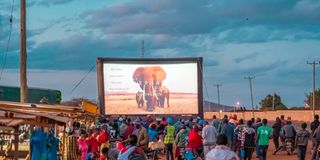Documentary inspires communities to change attitudes towards elephants

Samburu residents watch ‘The Elephant Queen’ wildlife documentary on a mobile cinema screen in Archers Post.
What you need to know:
- The filmmakers had the script translated into Kiswahili and Maa (the language of the Maasai and Samburu tribes), and began touring parts of Kenya as a mobile cinema to provide rural communities with insights on the true nature of elephants.
- The film made by filmmakers Mark Deeble, Victoria Stone and Etienne Oliff was shown on large screens erected in schools, in market places and other public areas.
Wildlife films can help with conservation efforts in communities facing human-elephant conflicts, a new study has shown.
The study conducted by Save the Elephants, a research and protection organisation, shows that nature films like the award-winning documentary ‘The Elephant Queen’ have the power to change human attitudes towards jumbos in marginalised communities and garner support for conservation.
The Elephant Queen Outreach Programme study conducted between November 2021 and June 2022 shows that 86.7 per cent of community viewers (aged 16-85) who watched ‘The Elephant Queen’ documentary changed their attitudes towards elephants.
On average, 79 per cent of viewers believed the film would change their interactions with elephants in the future.
About 88.4 per cent of viewers felt the film could change their whole community’s relationship with elephants.
The film also had a positive influence on younger generations, particularly students aged between 16 and 18.
They said they gained knowledge and affection towards elephants as others felt the benefits of elephants more keenly after watching the film.
"This suggests that continued exposure to educational content like ‘The Elephant Queen’ could foster a more positive outlook on elephants among Kenyan youth," says the study.
The human-elephant conflict is an increasing problem in rural Africa as elephants and humans compete for resources, resulting in crop damage and loss of life. "As a result, local communities often encounter elephants through intense or violent interactions, lacking awareness of the positive contributions these animals offer and rarely witnessing their natural behaviour in the wild. Films like ‘The Elephant Queen’ have the potential to alter this narrative."
The 'Elephant Queen' follows the lives of a Tsavo elephant herd, led by the matriarch Athena, their quest for water, and the extensive journeys they undertake for survival during droughts, emphasising their role as environmental architects crucial to numerous other species.
The filmmakers had the script translated into Kiswahili and Maa (the language of the Maasai and Samburu tribes), and began touring parts of Kenya as a mobile cinema to provide rural communities with insights on the true nature of elephants.
The film made by filmmakers Mark Deeble, Victoria Stone and Etienne Oliff was shown on large screens erected in schools, in market places and other public areas. Save the Elephants said within two years, the programme visited nearly 300 schools, over 200 villages and engaged with more than 135,000 people.
A total of 1,187 men and women from Tsavo, Arubuko and Amboseli were surveyed — 545 adults and 642 students.
The study shows that while adults gained knowledge and recognised the benefits of elephants, they also felt the challenges of living with the animals more profoundly after viewing ‘The Elephant Queen’.
Three iconic elephants have been killed in Samburu County in two years due to increased human-elephant conflicts. In November last year, an iconic elephant bull, Edison, which was popular among conservationists and tourists, was speared to death.
In 2022, bull elephants Sarara and Yeagar were killed in a suspected conflict with herders.





